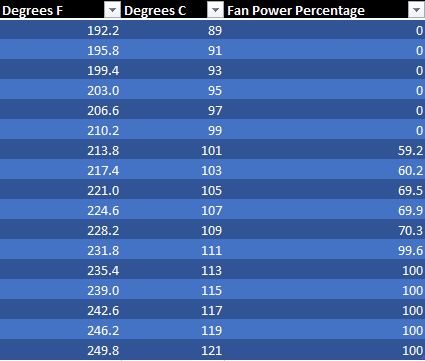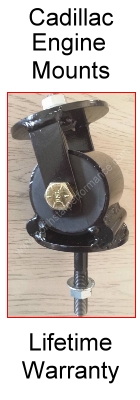|
|
|
Cadillac Northstar References
Cooling Fan Operation for Northstar V8 Engines
We get a lot of questions on how hot a Northstar should run. So let's get down to business!
The engine thermostat regulates engine temperature when there's enough air flow through the radiator, such as at highway speeds. When you slow down and there's not enough air flow through the radiator, such as sitting in traffic or idling in your driveway, the cooling fans regulate the engine coolant temperature. The proper thermostat for a Northstar V8 is a 195 degree T-stat and the best brand to stick with is AC-Delco when it comes to replacement. Most of the time when you're on the highway you'll see the engine temperature at 195 degrees F (90 degrees C). This indicates a fully warmed up engine. The PCM/ECM will monitor the engine coolant temperature and adjust the ignition timing and fuel as needed. A colder engine will burn more fuel (run richer). Once the engine temperature reaches 223 degrees F, both cooling fans come on low speed. If low speed fans cannot keep the temperature under control, the fans will turn on high speed at 234 degrees F. A few degrees of fluctuation is perfectly normal- so an engine temperature of 195 to 238 degrees F is perfectly normal for a Northstar and is NOTHING to be alarmed about.
Cooling Fans come on Low Speed: 223 Degrees F, or 106 Degrees C.
Cooling Fans come on High Speed: 234 Degrees F, or 112 Degrees C.
2006+ Northstars with E67 Controllers
Northstars with the E67 controller use a separate cooling fan control module that uses PWM (Pulse Width Modulation) to control the fan speeds. Instead of just high and low speeds like the older Northstars, the newer ones have variable speeds and will be given a certain power percentage based on engine coolant temperature.
Below is the table of fan power output vs coolant temperature for the Northstars controlled with the E67 ECM:

When To Be Concerned:
You should be concerned about your engine coolant temperature if it stays above 235 degrees F consistently or spikes to 240 degrees F or above. 240+ is not normal and idicates there is a problem. Shut the vehicle down at this temperature and let it cool before driving further. Make sure your cooling fans are on and your vehicle has enough coolant. Never, ever open a coolant reservoir/radiator cap when the engine is hot! You can be severely burned.
If your cooling fans are not coming on at all, the first thing to check/replace would be the cooling fan relays. Relays can fail and if they do, the cooling fans will either not work at all or work intermittently.
| |
|



|






